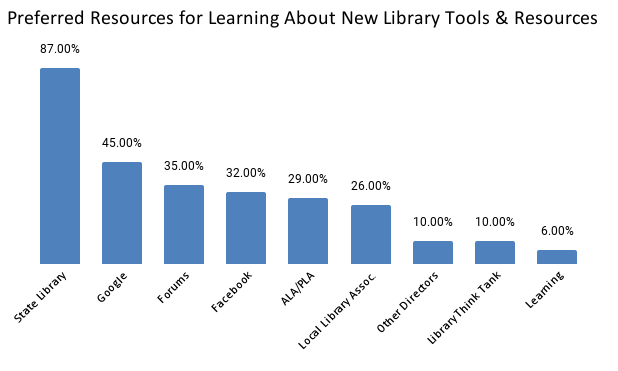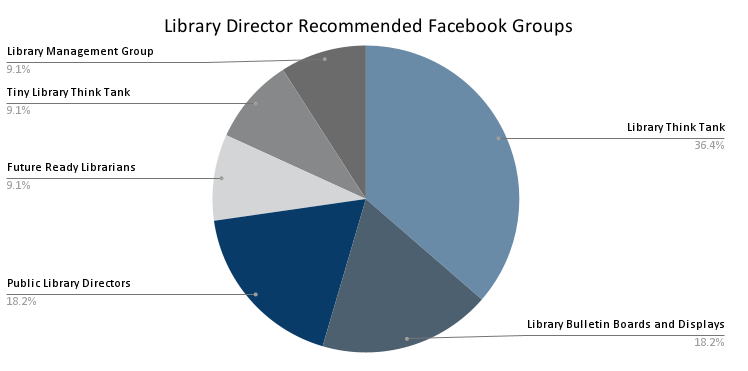How Directors Find Library Tools and Resources
Staying up-to-date with new tools and services in the evolving library landscape poses a common challenge for directors. As centers of learning, libraries play a critical role in bringing new technology and ideas to their communities. In our quest to understand how new library directors could learn about tools and resources, we conducted a survey and analyzed the results, which we are excited to share! The survey revealed the top sources of information reported by library respondents when searching for library tools and services:
Based on these findings, it is evident that libraries consider other libraries their primary source of information. The overwhelming majority of libraries polled emphasized the criticality of collaboration among libraries, from state libraries to local county associations, in disseminating new ideas and best practices. The exchange of ideas extends beyond library tools and resources, encompassing program engagement and even telehealth services.
Is it important to connect with other libraries?
So is it important to connect with other libraries? When asked, over 95% of respondents highlighted networking and connecting with other libraries and librarians as valuable for sharing ideas, resources, and experiences. They emphasized that there is no need to reinvent the wheel when planning new initiatives or completing annual reporting tasks. There are countless libraries willing to share their experiences and expertise!
Collaborative partnerships among libraries, vendors, and especially state libraries are viewed as a wonderful way to save time, money, and effort by leveraging solutions that have proven beneficial in other libraries. Networking provides exposure to new ideas, trends, and practices that can be brought back to one’s own community. Furthermore, connecting with local businesses and municipal groups offers an additional opportunity to pool resources for larger initiatives.
Professional development opportunities and active involvement in library associations are crucial for discovering new tools and services. Many respondents highlighted the value of networking for information and idea exchange. Among these associations, the American Library Association (ALA) stands out as a prominent resource. ALA offers a wide range of conferences, workshops, and online resources that empower library directors to stay up to date on emerging trends and innovative practices. Engaging with ALA and other library associations enables directors to forge meaningful connections, tap into years of expertise, and gain valuable insights to enhance their libraries’ offerings.
Local and Digital Resources
While time constraints concern some libraries with limited staff, the recognized benefits of connection cannot be ignored. Proactive library directors understand the importance of seeking new ideas to keep their libraries up to date for patrons. Libraries refer to various resources for connection, such as Facebook groups, local association conferences, and state library forums and listservs. We have listed some recommended Facebook groups for libraries below:
- Library Think Tank
- Library Bulletin Boards and Displays
- Library Management Group
- Future Ready Librarians
- Public Library Directors
- Tiny Library Think Tank
Keeping up with new resources and tools is undoubtedly challenging in the ever-evolving library landscape. However, libraries remain dedicated to introducing fresh technology and ideas to their communities. Our analysis of library respondents’ preferred sources of information underscores the significance of collaboration and knowledge sharing among libraries. By embracing networking, partnerships, and the resources provided by library associations, directors can effectively navigate the changing library landscape and better serve their communities.
Collaborative partnerships with libraries, vendors, and state libraries offer opportunities to leverage successful solutions and save time, money and effort. Various resources such as Facebook groups, local association conferences, and state library forums, facilitate this process of connection and knowledge sharing. By embracing these strategies, library directors can effectively navigate the evolving library landscape and better serve their communities.
If you would like to learn how WhoFi can help save time on administrative tasks so that you can focus more on connecting with other libraries for the future of the library you serve then we would like to meet. Visit whofi.com/demo to schedule a time to meet!





